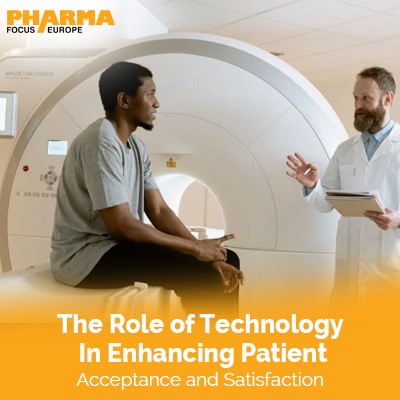
In today's rapidly evolving healthcare landscape, technology plays a pivotal role in enhancing patient acceptance and satisfaction. The integration of innovative technologies not only improves the quality of care but also transforms the patient experience, leading to better outcomes and increased engagement. This comprehensive guide explores the various ways in which technology influences patient acceptance and satisfaction, highlighting key trends, challenges, and future prospects.

Technology has revolutionized every aspect of our lives, and healthcare is no exception. From electronic health records (EHRs) to telemedicine and wearable devices, advancements in technology have reshaped how healthcare services are delivered and experienced. One of the critical areas where technology has made a significant impact is in enhancing patient acceptance and satisfaction. By leveraging digital tools and solutions, healthcare providers can create a more seamless and personalized experience for patients, ultimately leading to improved outcomes and greater patient engagement.
Telemedicine: Breaking Barriers to Access
Telemedicine has emerged as a game-changer in healthcare delivery, especially in remote or underserved areas. By utilizing video conferencing, mobile apps, and remote monitoring devices, healthcare providers can connect with patients virtually, eliminating the barriers of distance and accessibility. This not only enhances patient acceptance by providing convenient access to healthcare services but also improves satisfaction by reducing wait times and travel-related hassles. Patients can now consult with healthcare professionals, receive diagnoses, and access follow-up care from the comfort of their homes, leading to a more positive healthcare experience.
Electronic Health Records (EHRs): Enhancing Coordination and Efficiency
The adoption of electronic health records (EHRs) has transformed how patient information is managed and shared across healthcare settings. EHRs enable seamless communication and coordination among healthcare providers, ensuring that patients receive coordinated and comprehensive care. With access to real-time patient data, healthcare teams can make informed decisions, reduce medical errors, and improve treatment outcomes. Patients benefit from EHRs by having their medical history, test results, and treatment plans readily accessible to authorized providers, enhancing continuity of care and overall satisfaction.
Wearable Health Technologies: Empowering Patients
The proliferation of wearable health technologies, such as fitness trackers, smartwatches, and remote monitoring devices, has empowered patients to take a more active role in managing their health. These devices provide real-time data on vital signs, activity levels, and medication adherence, allowing patients and healthcare providers to track progress, identify trends, and make data-driven decisions. By engaging patients in self-monitoring and self-care activities, wearable technologies promote accountability, motivation, and a sense of control over one's health, leading to improved patient acceptance and satisfaction.
Patient Portals: Facilitating Communication and Engagement
Patient portals serve as centralized platforms where patients can access their medical records, schedule appointments, communicate with healthcare providers, and manage their health information securely. These portals enhance patient-provider communication, facilitate timely access to healthcare services, and empower patients to be active participants in their care journey. Features like secure messaging, appointment reminders, prescription refills, and educational resources contribute to a more personalized and patient-centered experience, fostering trust, satisfaction, and loyalty.
Artificial Intelligence (AI) and Predictive Analytics: Personalizing Care
Artificial intelligence (AI) and predictive analytics have revolutionized healthcare by enabling personalized and proactive care delivery. AI algorithms analyze vast amounts of data to identify patterns, predict outcomes, and customize treatment plans based on individual patient needs. This personalized approach not only improves treatment efficacy but also enhances patient acceptance by addressing specific concerns, preferences, and goals. AI-driven tools, such as chatbots for triage, virtual assistants for medication management, and decision support systems for diagnosis, streamline healthcare processes and enhance the overall patient experience.
Challenges and Considerations
While technology offers immense potential in enhancing patient acceptance and satisfaction, there are challenges and considerations that healthcare providers must address. These include privacy and security concerns regarding patient data, interoperability issues between different technology systems, digital divide and accessibility barriers for certain patient populations, regulatory compliance and ethical considerations related to AI and telemedicine, and the need for ongoing training and education for healthcare professionals and patients to effectively utilize technology-enabled solutions.
Future Directions and Opportunities
Looking ahead, the future of technology in healthcare holds promising opportunities for further enhancing patient acceptance and satisfaction. Advancements in virtual reality (VR) and augmented reality (AR) technologies can revolutionize medical education, patient education, and surgical procedures, offering immersive and interactive experiences. Blockchain technology holds potential for improving data security, interoperability, and transparency in healthcare transactions. The integration of genomics, precision medicine, and personalized health interventions will further personalize care and optimize treatment outcomes. Additionally, the continuous innovation and adoption of digital health solutions will drive patient-centered care models and empower individuals to lead healthier lives.
Technology serves as a catalyst for transforming healthcare delivery, improving patient outcomes, and enhancing overall satisfaction. By embracing and leveraging innovative technologies such as telemedicine, EHRs, wearable devices, patient portals, AI, and predictive analytics, healthcare providers can create a more connected, efficient, and patient-centric ecosystem. The key lies in harnessing the power of technology to empower patients, personalize care, and build trust, ultimately leading to greater acceptance, satisfaction, and well-being in healthcare.